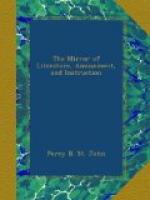It was in the course of the sixteenth century that the psalmody of England, and the other Protestant countries, was brought to the state in which it now remains, and in which it is desirable that it should continue to remain. For this psalmody we are indebted to the Reformers of Germany, especially Luther, who was himself an enthusiastic lover of music, and is believed to have composed some of the finest tunes, particularly the Hundredth Psalm, and the hymn on the Last Judgment, which Braham sings with such tremendous power at our great performances of sacred music. Our psalm-tunes, consisting of prolonged and simple sounds, are admirably adapted for being sung by great congregations; and as the effect of this kind of music is much increased by its venerable antiquity, it would be very unfortunate should it yield to the influence of innovation: for this reason, it is much to be desired that organists and directors of choirs should confine themselves to the established old tunes, instead of displacing them by modern compositions.
Towards the end of the sixteenth, and beginning of the seventeenth, century, shone that constellation of English musicians, whose inimitable madrigals are still, and long will be, the delight of every lover of vocal harmony. It is to Italy, however, that we are indebted for this species of composition. The madrigal is a piece of vocal music adapted to words of an amorous or cheerful cast, composed for four, five, or six voices, and intended for performance in convivial parties or private musical societies. It is full of ingenious and elaborate contrivances; but, in the happier specimens, contains likewise agreeable and expressive melody. At the period of which we now speak, vocal harmony was so generally cultivated, that, in social parties, the madrigal books were generally laid on the table, and every one was expected to take the part allotted to him. Any person who made the avowal of not being able to sing a part at sight was looked upon as unacquainted with the usages of good society—like a gentleman who now-a-days says he cannot play a game at whist, or a lady that she cannot join in a quadrille or a mazurka. The Italian madrigals of Luca Marenzio and others are still in request: and among the English madrigalists we may mention Wilbye, author of “Flora gave me fairest flowers;” Morley, whose “Now is the month of Maying” is so modern in its air, that it is introduced as the finale of one of our most popular operas, the Duenna; and Michael Este, the composer of the beautiful trio, “How merrily we live that Shepherds be.” This music retains all its original freshness, and has been listened to, age after age, with unabated pleasure.
The glee, which is a simpler and less elaborate form of the madrigal,—and that amusing jeu d’esprit so well known by the name of Catch, made their appearance about the end of the sixteenth century. The first collection of catches that made its appearance in England is dated in 1609.—Metropolitan.




